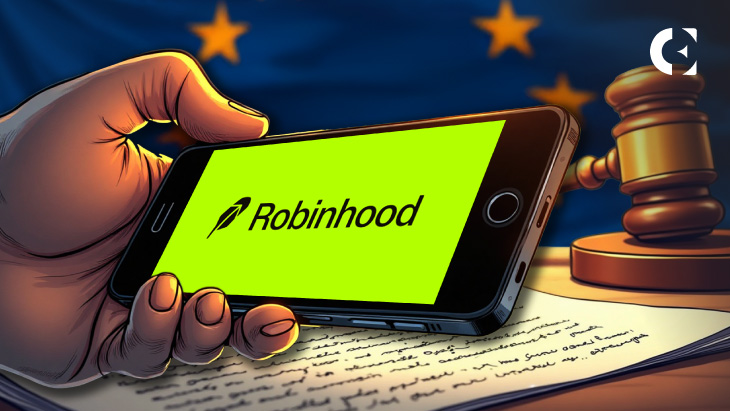- Robinhood’s stock token plan triggers EU regulatory review over structure and compliance.
- OpenAI disputes token linkage, prompting scrutiny from the Bank of Lithuania.
- 215 tokens issued on Arbitrum as Robinhood tests blockchain-based stock exposure tools.
Robinhood Markets is facing regulatory scrutiny in the European Union following its rollout of blockchain-based stock tokens tied to the private firms OpenAI and SpaceX. The campaign, which started on June 30, is now being examined by the Bank of Lithuania, the primary authority overseeing Robinhood’s EU operations. Questions have arisen over the structure and legal classification of the digital instruments.
The inquiry follows public warnings from OpenAI, which distanced itself from the promotion and cautioned that the offering may mislead users into believing they hold real equity in the company.
Lithuania’s Central Bank Demands Answers
According to a statement reported by CNBC, the Bank of Lithuania has formally requested that Robinhood provide detailed information about the nature of the stock tokens, which were issued on the company’s new blockchain infrastructure.
Giedrius Šniukas, a spokesperson for the central bank, confirmed that regulators are still awaiting a response from Robinhood. He stated they will assess the compliance of the instruments only after reviewing the submitted data.
Related: Robinhood Launches Ethereum Layer 2 with Arbitrum
Robinhood CEO Vlad Tenev, speaking to Bloomberg Television, acknowledged the inquiry and said that regulators are reviewing the legal framework of the product. Tenev clarified that the tokens are structured as derivatives intended to provide indirect exposure to the underlying assets, not as direct equity shares.
OpenAI and SpaceX Tokens Not Yet Tradable
According to the legal notice associated with the offering, the tokens in question are linked to private firms, and Robinhood values them using its own internal models. These tokens are not available for trading at this stage. Following OpenAI’s public warning, Robinhood renamed one of the tokens to “Demo 1,” indicating that the product remains in a pilot phase.
Despite the regulatory uncertainty, on-chain data confirms that Robinhood has issued approximately 215 stock tokens using the Arbitrum Layer 2 network. The company continues to test its smart contracts and has expressed its intention to introduce additional tokenized assets, including over 200 U.S. stocks and ETFs, to its European users later in the year.
Related: How Will Robinhood’s Arbitrum-Built Tokenized Stock Offering Impact European Investors?
The stock token initiative is part of Robinhood’s broader move to expand its tokenization strategy in Europe. Alongside the token launch, the company introduced a proprietary Layer 2 blockchain built on Arbitrum to support future offerings. Plans also include launching perpetual-futures trading, although timelines remain unspecified.
Disclaimer: The information presented in this article is for informational and educational purposes only. The article does not constitute financial advice or advice of any kind. Coin Edition is not responsible for any losses incurred as a result of the utilization of content, products, or services mentioned. Readers are advised to exercise caution before taking any action related to the company.







